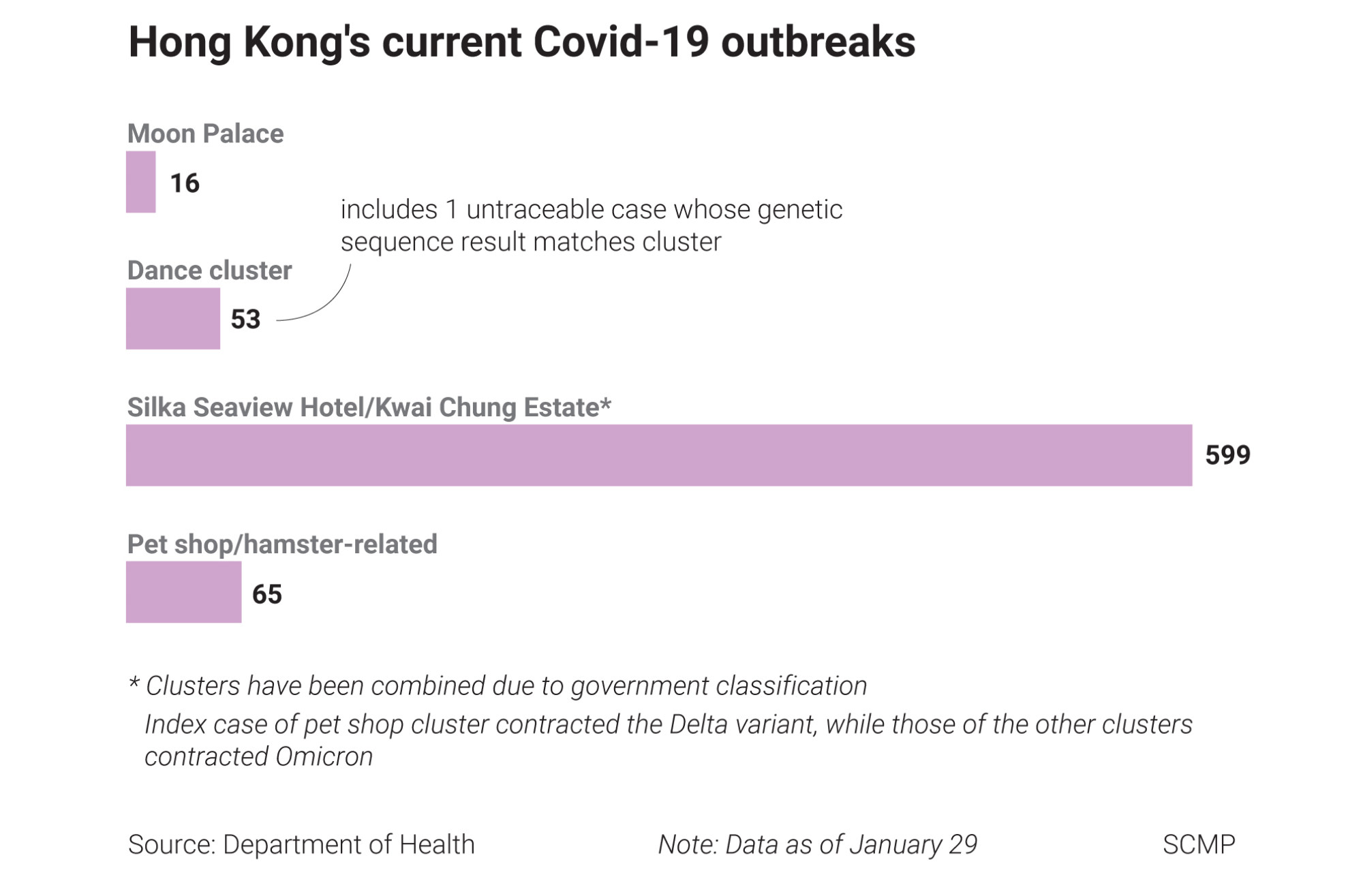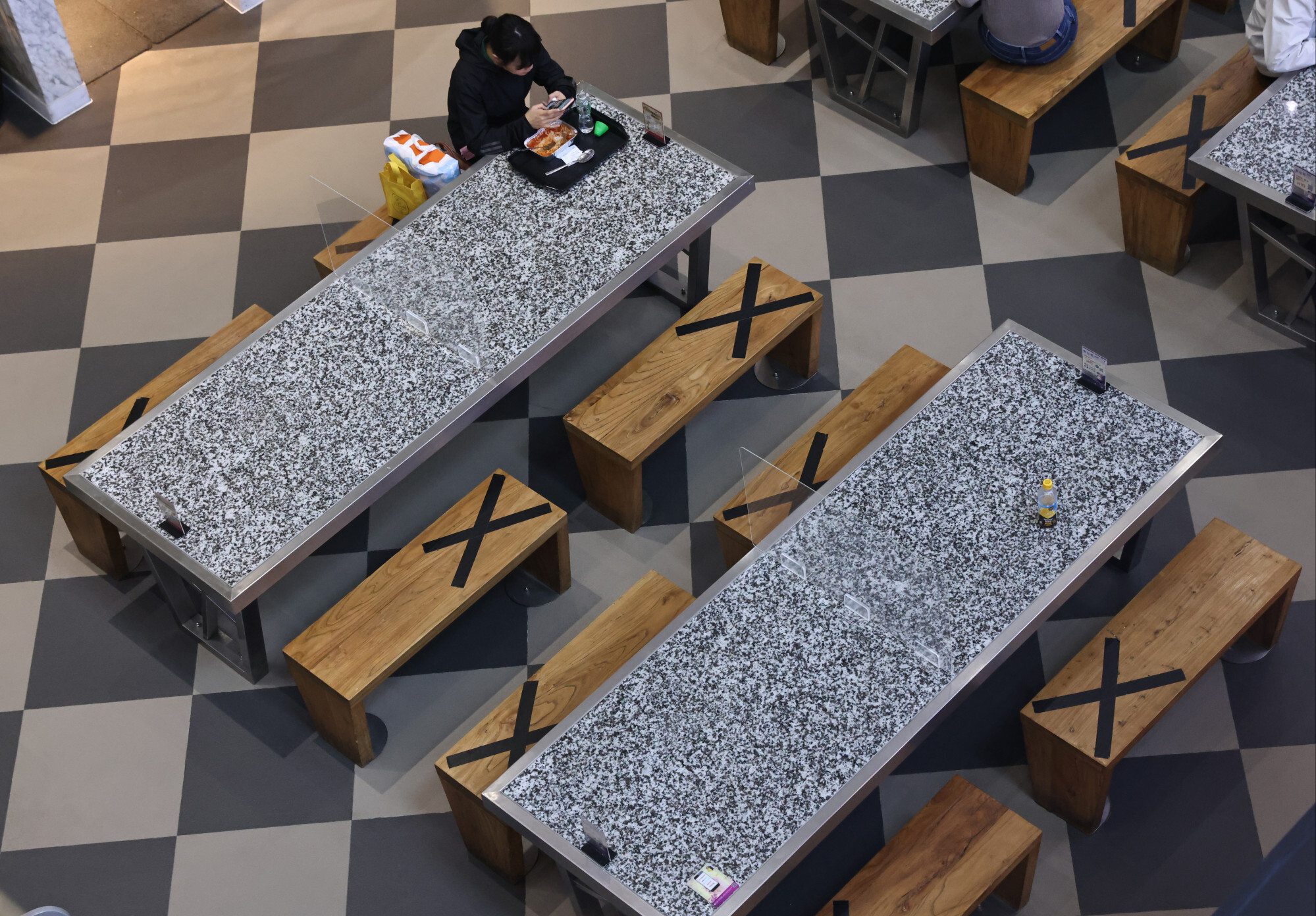
Coronavirus: Hong Kong reports drop in daily caseload to double digits, but officials concerned about rise in untraceable infections
- Dr Chuang Shuk-kwan, of the Centre for Health Protection, warns: “Although the number of daily cases is declining, the proportion of untraceable cases has increased”
- Meanwhile, the government has issued a clarification that public debate over the effectiveness of its ‘zero-infection’ strategy does not violate the national security law
Hong Kong on Sunday reported a drop in coronavirus infections to double digits for the first time in a full week, but health authorities cautioned that the city could not afford to let its guard down as the proportion of untraceable cases had gone up.
The government confirmed 81 new Covid-19 cases – 77 locally transmitted and four brought in from overseas – as it also issued a clarification that public debate over the effectiveness of its “zero-infection” strategy would not violate the national security law.
The assurance came in response to a hardline pro-establishment politician’s controversial suggestion that calling for a “live with the virus” policy might be in breach of the law at a time when the city’s battle against an Omicron-fuelled fifth wave of the pandemic had become a matter of national health safety.
More than 70 preliminary-positive cases were also reported on Sunday.
“Although the number of daily cases is declining, the proportion of untraceable cases has increased,” said Dr Chuang Shuk-kwan, head of the Centre for Health Protection’s communicable disease branch. “The transmission chains in the community remain unclear; we do not know what some of the transmission paths were.”
Chuang noted that three housing estates – Yau Lai Estate in Yau Tong, Shek Yam Estate in Kwai Chung and Tivoli Garden in Tsing Yi – had reported vertical transmissions within tower blocks, leading to the evacuation of about 30 flats.
Officials again urged the public to observe social-distancing rules and avoid crowded places, even as Hongkongers on holiday for the Lunar New Year season flocked to markets and shopping centres.
“For the coming Lunar New Year, I understand many families would like to gather together and share meals and enjoy the festival,” Chuang said. “I would like to alert them to be careful, especially if there are elderly people involved who are not yet vaccinated. If they get infected, there may be some complications.”
The proportion of untraceable Covid-19 infections on Sunday rose to 18 per cent from 9 per cent.
Chuang said although eight residents of Kwai Chung Estate, where some buildings recently emerged from lengthy lockdowns, were among the new cases – all of them testing positive at quarantine facilities or hospitals.
She noted the spread of the coronavirus at cross-family gatherings, with one case involving the infection of 10 members among a group of 12.

A small outbreak was also reported among staff of Shatin Methodist College, with two out of 12 janitors confirmed to be infected, while some tested preliminary-positive.
An unrelated preliminary-positive case involved an acting senior taxation officer from the Inland Revenue Department, who was mainly responsible for internal clerical work rather than interacting with the public.
Authorities also staged overnight lockdown operations on Sunday evening at Shek Wah House in Kwai Chung, as well as Yin On Street and Tsun Fat Street in To Kwa Wan.
Professor Lau Yu-lung, who chairs the government’s scientific committee on vaccine-preventable diseases, conceded that it would be difficult to achieve the city’s long-held zero-Covid target amid the current Omicron outbreak because of the variant’s high transmissibility.
The aim of the current social-distancing measures was to slow down the spread of the variant so as to buy time to boost the vaccination rate, he said. Once the vaccination rate was high enough, the government could ease social-distancing measures based on multiple data, instead of shutting down premises and suspending face-to-face school classes without allowing for any flexibility.

Currently, 79.4 per cent of the eligible population has received a first dose of vaccine, still well shy of Lau’s target of 90 per cent of all city residents.
“The exit plan is now clear … We must urge residents, especially the elderly and students, to get vaccinated,” he said, adding that he hoped the city would be 90 per cent inoculated by October.
Chief Executive Carrie Lam Cheng Yuet-ngor has also set an inoculation target of 90 per cent – though she did not specify whether that was the share of the eligible or total population – and promised to re-evaluate the overall situation after reaching that goal.
Health chief Professor Sophia Chan Siu-chee reiterated that target in a blog post on Sunday, urging residents to get vaccinated. She said restrictions could be relaxed based on an improving situation and implementation of a vaccine pass allowing only inoculated people to enter specific premises.
Pro-establishment lawmaker Junius Ho Kwan-yiu had suggested on Saturday that pushing for the goal of living with the virus could contravene the national security law, but the government issued a statement on Sunday clarifying that “general remarks and discussion” on the effectiveness of the official zero-Covid strategy were not illegal.
“Hong Kong must cut the transmission chains as quickly as possible, with an aim of achieving dynamic zero infection, otherwise the consequences could be dire,” the statement added.
Meanwhile, a survey conducted between January 24 and 28 by the Bauhinia Institute, a pro-Beijing think tank based in Hong Kong, found that two-thirds of 1,063 respondents believed the “dynamic zero-Covid” strategy was more compatible with the city’s interests.
In another development, the government announced the resumption from Monday of quarantine-free arrangements for arrivals from Zhuhai through the Hong Kong-Zhuhai-Macau Bridge under the “Return2HK” and “Come2HK” schemes.
The resumption reflected the removal of Zhuhai’s Xiangzhou District from Hong Kong’s list of at-risk places eligible for these schemes. The quarantine exemption for travellers was suspended earlier this month because of surging infections in mainland China.


